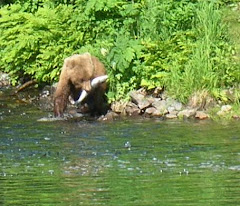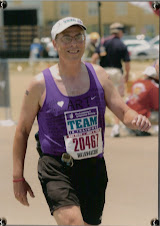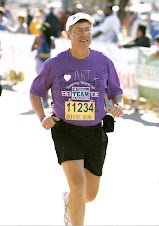This is the first of my detailed posts addressing charges that Team in Training is a scam, which I very much dispute.
The charge that I have seen in a number of running bulletin boards is that TNT is responsible for driving up the cost of race entry fees (and hotels in the city of the race) because courses are kept open 5, 6, 7, or even 8 hours for slower runners. Frankly, I call this ridiculous! And here is why.
First, any race has both fixed costs and variable costs. The variable costs are what will go up with each runner - the cost of your medal, official shirt, snacks, timing chip, and so forth. The fixed costs will stay about the same whether or not there are 1,000 runners in the race or 30,000. There are certain expenses that the organization sponsoring the race will have to cover, period. I don't know how much of each race fee, say $150 for the Chicago Marathon, covers the variable costs as opposed to the fixed costs, but with at least 35,000 runners, that fee will bring in $5,250,000 for Chicago. Lets assume that 75% of that amount is variable costs and 25% of the costs are fixed. So given that assumption, the fixed costs - which must be covered equally by the number of participants - would be about $1,300,000.
In 2011, there were 35,755 finishers in the Chicago Marathon. If they wanted to impose a strict time limit to avoid the cost of keeping the race course open for longer times, they could do this by imposing a 4.5 hour limit. 15,734 runners in Chicago beat this time, so let's call it 20,000 runners to be allowed, proving a 4.5 hour time limit. That 1.3 million dollar fixed cost, which could be shared by 35,000 runners (about $36 each) would now have to be covered by 20,000 runners ($65 each). So everyone's fee would go up by $29. There might be perfectly good reasons for limiting registrations based on time (Boston is quite successful), but reducing the fee because race courses are not kept open as long is not one of them.
Here is a second piece of evidence. The fee for the Nike Women's Marathon is $135 for the full marathon ($115 for the half). This race is an official sponsor of the Leukemia and Lymphoma Society, and has very heavy Team in Training presence - out of 20,907 finishers, 3,728 (18%) were from TNT. I could not find numbers of TNT runners for the Chicago Marathon, but it is certainly much lower. Do you remember the movie "The Spirit of the Marathon?" How many purple shirts in the Chicago field did you see during the course of the movie? I remember about a half dozen, although I would guess that several hundred participants of the 35,000 in Chicago run for TNT. The marathon fee is $150, slightly higher - not lower - than that of Nike's.
Incidentally, the Boston Marathon has a fee of $130. The marathon has fast times to qualify. A small amount of charity runners participate, and they pay an extra fee to do so - plus they do fundraising.
So how is TNT driving up the race entry costs for everyone? In a word, it's not - that charge just makes no sense.
It also is illogical that TNT is driving up the cost of hotels. A marathon weekend is a huge deal for a city, and hotels and restaurants are going to be full. When demand is up, costs go up. It is possible that LLS can get a lower group rate by guaranteeing several hundred rooms at a hotel, but how is that any different from any other group - such as a convention? It's not.
If anyone out there has empirical data that shows how TNT is increasing the costs of race entry fees, please share it. Until I see proof, I'm calling BS on this one.
The Group Hike That Kind of Wasn't
6 years ago




















2 comments:
What about my appearance fee? LOL
Well, that was half of the $1.3 million! ;^)
Post a Comment